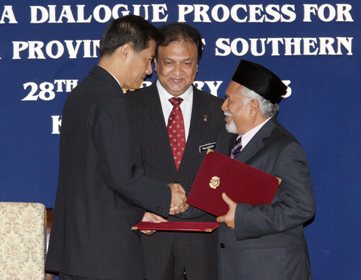Who want to undermine the peace dialogue process?
Calls from quite a few people, myself included, for the government to rethink the peace dialogue process with the Barisan Revolusi Nasional (BRN) separatist group have been met with a blanket accusation that these critics or doubters are attempting to undermine the process.

Personally, I don’t think that any person with a common sense who are not a party in the ongoing colour-coded political conflict has wanted the peace process to collapse. All the doubters have wanted is for the government to review the process so that the process can move forward for the benefit of the public as paramount.
As for the allegation that the doubters of the peace process are narrow-minded, I think that the accusers themselves should not view the critics with suspicion and narrow-mindedness. It must be accepted that the open peace talks have weak points just as the closed-door talks which also have the loopholes. Critics or doubters of the peace process have simply wanted these shortcomings to be fixed.
Some people have accused the military for being the sole culprit for all the abuses in the restive far South which are the root cause of the unrest without raising a voice against the other side which is as guilty as the military for the violence claimed to be carried out in the name of liberation or freedom fighting. Some of these perpetrators went to the extent of deliberate killing their own comrades just to suit their cause.
Of course, several governments in the past before and after January 4. 2004 when the separatists unleashed the insurgency war by raiding an armoury in Narathiwat and stole more than 400 war weapons resorted to the use of force to deal with the problem which has been proven to be the wrong approach. But it should not be overlooked that past and present governments have tried to mend fence and that has resulted to some improvements of the situation.
I agree that the government should lend more emphasis on resolving the unrest problem through political means or peace process. But that does not mean that the government must wholeheartedly embrace peace process while ignoring all the criticisms and calls for a pause to rethink the process.
Anyway, peace dialogue process still remains the one of the best approaches to resolving the unrest problem. But the process itself needs help from the other mechanisms so that it can move on smoothly. Addressing the problem of injustice is one example.
It has been generalized that Thais are hot-tempered. So the authorities concerned themselves must not show their tempers because everything problem takes time to be resolved. After all, the calls or proposals for the government to review the peace talks process are not the final conclusion of the problem.
It is difficult to pinpoint whether all the violent incidents which took place after the signing of the peace process framework on February 28 in Kuala Lumpur were related with the process or not. But ask anyone in the region how he or she feels about the situation there, I guess that you may know the answer. Whoever once said that the war in the deep South is a "war of feelings" appear to have forgotten what they said and now are ignorant of the "feelings" of the people in the restive region.
A former separatist leader once told an alternative media that the problem in the region is about feelings – that is while the government insisted that the situation has improved, the local people feel it is not the case. So the government will find ways to deal with the feelings problem.
But anyone who are excited with the opinion of this former separatist leader especially his reference to the "war of feelings" should not overlook the feelings of the Thai society which is a stakeholder in this conflict. So instead of trading diatribes in the cyber space, why not all the opposing sides, both ethnic Malay and Thai, sit down together to try to address this problem of "war of feelings".
If the four legs of a table are strong, the table itself cannot collapse simply because of the words from the mouths of some people.
Last but not least, for those who are not happy with the opinions voiced in this column, "Talk with the Editor", I would like to clarify that this is a forum for free expression which is subject to criticism whether it is right or wrong. More importantly, the role of the media is not just reporting facts but also serves as a medium through which the opinions of the people are presented to the public.
Further explanation of the meaning of the attempt to block free expression of opinions is needless here.
-------------------------------------------------------------------------------------------------------------------------------
Note : This article was translated from the editorial of Isranews Center "ใครจะล้มโต๊ะเจรจา?" http://bit.ly/10xFKIy
